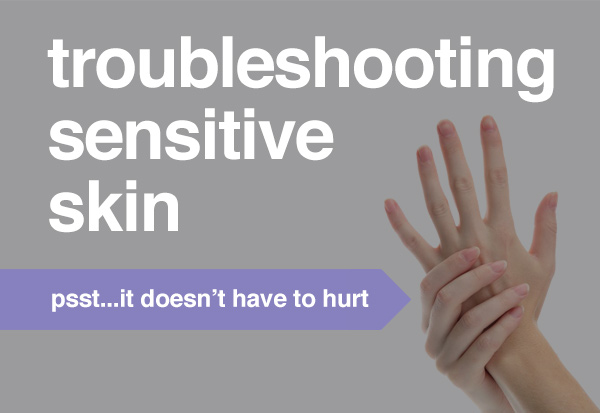Does your skin ever itch, get hives, have eczema, psoriasis, rosacea, prone to break out, easily irritated, redness, sting, tingle, burn, react to products you apply, or do you have a compromised skin barrier due to genetics or over-exfoliation and skin treatments? Or maybe you have allergies or a skin condition or have Uncle Bob’s ruddy complexion after he has a glass of whiskey. Then, my friend, you have sensitive skin. “Sensitive skin” is a ginormous umbrella that encases multiple skin grievances. There is no magic pill that can cure your sensitive skin issues. Troubleshooting sensitive skin all depends on what you’re sensitive to. There is no true hypo-allergenic ingredient. There is no one set of products or skin care routines that will benefit everyone. But hope is not lost. Recommendations for sensitive skin: • Consult with skin care professionals and seek the advice of both dermatologists and licensed estheticians. They may prescribe different routes to help you with your problem and it’s important to educate yourself and stay informed about your condition. • Always use a patch test when trying a new product. • If your patch test is clear, slowly work your way into using the product with regularity. If it’s a product for everyday use start with 2–3 times a week and work it slowly into your daily routine. • Always use tepid water and avoid the extremes. • Keep your skin well moisturized and don’t allow it to dry out too severely. Guidelines for choosing products: • Avoid irritants like scrubs made from shells, bar soaps, astringents and use all exfoliates with extreme caution. • Avoid common skin allergens like imidazolidinyl urea, quaternium 15, preservative Methylisothiazolinone, fragrances and dyes. • Avoid sulfates, propylene glycol, ascorbic acid, retinol and possibly most essential oils. Especially ones like cinnamon, peppermint, geranium, sandalwood, bergamot and clove. • Beware of baby wipes and make-up removing cloths and check ingredients before using. Dealing with sensitive skin takes a lot of trial and error. If you’re lucky enough to be able to identify your sensitivities, you’re one huge step closer to fixing the problem. You can find solutions to your issues most of the time if you’re willing to spend the time. And finally, find a company that will either send you samples or give you a money back guarantee. Sensitive skin may be a pain in the ass, pun intended, but there are companies out their who care and want to help you find the product that works for you. ]]>

